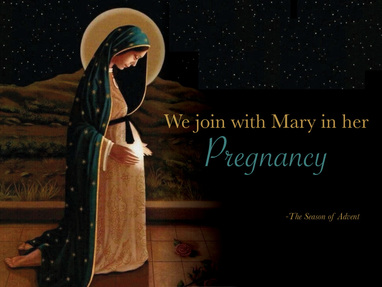
I thought for a long time that GOD was up here and WE were down here and everything up there was good and wonderful and holy and amazing and everything down here was bad and ugly and just the everyday crap you had to put up with. I would come to church on a really good day or go on a retreat, or to a conference or something and I would (hands meet) MEET GOD. I would have this wonderful experience where I got to FEEL God and I thought that’s what being a Christian was all about. People said that God was always with me, but that was something I just had to believe, it didn’t really make much sense in my real life at the time. What I thought was that everything holy, everything spiritual, everything meaningful and life-changing, was separate from the everyday things, the practical things, the hard things.
One year during advent I started to think and talk about this separation. Someone pointed out to me that this might not be the most helpful way of understanding things. During Advent, we anticipate Christmas, and we prepare to receive Jesus, or God, as a human being. Advent has become my favourite time of year as I always look forward to hearing Vic share his passion for the Incarnation – God made flesh. As I started thinking about this, I began to see that for me, God becoming a human, Mary becoming pregnant and Jesus being born, this means that there is no separation. I began to discover that for me, thinking of all of these things as separate doesn’t give me a good picture of what life is really like. Us and God, of the holy things and the mundane things, beautiful things and boring things, life, and death. The separation I had learned about, the idea of God being up here and us down here, wasn’t the most revealing way of understanding God for me. I was beginning to see a different way of painting the picture of what God is like. It occurred to me that perhaps when we consider Advent and Christmas, we can see that we are here, AND God is here. The incarnation, God becoming human, shows us that the holy things, the good things, the beautiful and wonderful things, they are here too.
This is not a new idea. The Franciscan Monks, who have been around for centuries, believe that there is no clear distinction between the sacred and the “profane” or ordinary, because Christ existed in matter, from all eternity. When the Bible talks about creation, it says in Colossians that in Jesus, all things were created. Everything was created through him and for him. Jesus, holds everything together. For the Franciscans, God is everything – a rock, a tree, an animal, an angel, a human. So that is what I want to share with you. I want to share with you the idea that GOD IS WITH US. Goodness and beauty. They are with us. The main way that I think of God, is as LOVE. So, Jesus as a baby in a dirty manger means that LOVE is not something far away or separate from everyday life. Love is with us!!
So I would like to better understand the idea that GOD IS WITH US. So I want to use a more hands-on picture to help us understand it. I want to use pregnancy. Pregnancy is something I’ve been thinking deeply about for around 9 years now. I love thinking about it, talking about it and understanding it. And I think Advent is a good time to bring it up since, during this time of anticipation we have the very distinct honour of joining with Mary in her pregnancy. We join in the anticipation, and the longing, and the counting down the days, until her baby is born. So fabulous!
Vangie Bergum writes about her experience in her book, Woman to Mother: A Transformation. I will read her words slowly and hopefully you’ll be able to grasp it. Try not to get hung up on individual words that you don’t understand (it is quite wordy), but instead try to listen for the overall message.
The being “with” child is not the “with” that means “as a companion” or “next-to” or “in the charge of”. Being “with child” is a primordial, [ancient, basic, fundamental] relationship, particular to women who carry, within their own bodies, the body of another. Being “with child” is a commingling, an entangling, an interlacing that goes beyond companionship. It is a mysterious union, unlike any other. Not only is the fetus bound to the woman through the nourishing pathways running through the umbilical cord, but child and woman are truly one body. What affects the woman affects the fetus, and as the child evolves, so does the mother. The mother and fetus are one, an indissoluble, [or inseparable] whole, yet two, a mother and a child. There is no closer union.
Vangie Bergum, “Woman to Mother, A Transformation”, 1989
For me the experience of pregnancy is an incredible one because it challenges our ideas about what it means to be an individual person. First of all there are two people inside one body, those two are so closely connected that it actually makes sense to think of them as one. The baby inside the mother’s body is very sensitive and is affected by everything that the mother experiences. A baby is born with certain preferences for foods because they actually taste what the mother eats. Babies are even affected by the mental health of the mother – if she is undergoing a lot of stress or grief, or anxiety, the baby responds to that, and the development of their brain is affected by that. And of course, the mother is affected by the baby. As the baby grows, so does the mother! When the baby kicks, the mother feels it. I always think of this one quote I read where a woman says something like, “if I’m in a conversation and the baby kicks, it’s distracting. Wouldn’t you be distracted if someone kicked you in the middle of a conversation? The fact that it’s coming from the inside doesn’t make that much of a difference…” When the baby needs more of a certain nutrient, the mother’s body sacrifices its nutrients for the baby and produces what the baby needs. It is remarkable. The mother and the baby are two AND one.
As non-pregnant people we tend to take for granted the idea that each person is separate from every other person, that each person has one body, and that each body has one person! We don’t stop to think about the fact that it’s “just me” in the body we are in. But in pregnancy, there are two in one body! When I was pregnant I can remember wondering if I should refer to myself as “we” or “I”. I’d make plans with my mom and say “Yup, I’ll be there in an hour”. But I wondered if I should say “Yup, we’ll be there in an hour”. Also, and I’m sure all of you who have had children can remember the moment you stood up after giving birth to a child and you felt the emptiness of your insides. This isn’t just a poetic way of saying how you felt after you gave birth. I LITERALLY felt that my body was empty inside. I remember shortly after giving birth feeling something in my abdomen and instinctively thinking of that feeling as the baby moving. But then I would realize that I didn’t have a baby inside me anymore. And I would actually feel alone in my body. I would miss having that other being to share my body with. Before you experience pregnancy, you never pause to think, hmm. I am alone in my body. Pregnancy is such a unique and fantastic experience because it really allows us to experience a connection to another being that is unlike any other relationship.
So let’s take some time to look further into this spectacular experience. I’d like us to look at two more quotes together. We are going to talk about what the quotes are actually saying about being “WITH CHILD”, but then we are going to think about how being “with child” can teach us about the way that God is “with us”.
Iris Young, “Pregnant Embodiment: Subjectivity and Alienation”, 1984
- What stands out to you about this description of pregnancy?
- When you consider being with child in this way, what can we learn about God being with us? What similarities can you see between the two?
Conception is the beginning of a bizarre story. In pregnancy there are two bodies, one inside the other. Two people live under one skin. When so much of life is dedicated to maintaining our integrity as distinct beings, this bodily tandem is an uncanny fact. Two-in-one-body constitutes a biological enigma, as for reasons we do not quite understand, the mother-to-be’s body suppresses her immune defences to allow the partly foreign body to reside within her.
Joan Raphael-Leff, “Pregnancy: The Inside Story”, 1993
- What stands out to you about this description of pregnancy?
- When you consider being with child in this way, what can we learn about God being with us? What similarities can you see between the two?

 RSS Feed
RSS Feed

